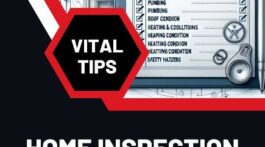Are you on the precipice of making one of the most substantial investments of your life? Is buying that dream home in Massachusetts turning into a nightmare because you’re unsure about its actual condition?
With a well-versed understanding of the home inspection report, you could save yourself from falling into a money pit. Buckle up and dive in as we explore what to look for in a home inspection report and crucial red flags that should make you reconsider purchasing.
This could be the difference between your sweet dream haven or an unforeseen financial disaster.
Walking away from a home purchase after a home inspection is a significant decision that depends on various factors.
While there isn’t a definitive rule, significant issues such as mold, substantial structural or foundation problems, water damage, pest infestations, failing septic systems, fire damage, hazardous electrical wiring, or severe plumbing concerns may warrant considering walking away.
When making this determination, it is crucial to weigh the cost of repairs, potential hidden expenses, ability to address issues with sweat equity, and overall affordability of the house, plus repair costs. Consulting with experts, such as reputable inspectors, is strongly advised to ensure an informed decision.
From many years of experience in selling real estate in Massachusetts, many home buyers don’t always make the best decisions. Sometimes buyers walk away when they shouldn’t and other times they hang in and are stuck with a financial burden.
Deciphering the Home Inspection Report
A thorough inspection is crucial when buying a house in Massachusetts. You will undoubtedly find things not mentioned in the seller’s disclosure form.
When you receive the home inspection report, it can be overwhelming to decipher all the information presented before you. However, by understanding how to navigate through this document, you can gain valuable insights into the property condition you intend to purchase.
The report will typically include a detailed overview of the inspector’s findings regarding the various aspects of the home, such as plumbing, electrical systems, HVAC units, appliances, roof, and foundation.
The home inspection report is a comprehensive assessment of the property’s condition. It will outline any issues or concerns identified during the inspection process.
Take your time to review each section carefully and pay attention to areas flagged as significant defects or issues, as they could significantly impact your decision-making process.
Finding substantial problems is common when buying a house sold as-is in Massachusetts.
Understanding Significant Defects and Issues
In the home inspection report, significant defects or issues require immediate attention or pose a substantial risk to the property’s safety, integrity, or functionality. These defects range from major mechanical problems to structural and other issues like water damage or mold infestations.
There will likely be many cosmetic issues as well. You shouldn’t sweat these items, as most homes have minor problems.
Considering the significant defects and issues seriously is essential, as they may require costly repairs or affect your ability to obtain a mortgage.
For example, major structural/foundation issues, water damage, pest infestations, failing septic systems, fire damage, knob and tube wiring, and plumbing concerns are generally considered significant defects that could have a substantial impact on your decision to proceed with the purchase.
Imagine finding out that there is extensive water damage and mold in the basement after receiving your inspection report. Not only would this require costly remediation work, but it could also compromise your health and well-being if left unaddressed.
Remember that not all issues identified in the inspection report may be deal-breakers. Some concerns might be relatively minor and can be addressed through repairs or renovations.
It’s crucial to evaluate the severity of these defects, consider the cost of repairs, potential unseen expenses, and your ability to fix or mitigate the problem with sweat equity.
Ultimately, the decision to walk away from a Massachusetts house purchase after reviewing the home inspection report should be based on careful consideration of your willingness to take on repairs or potential risks and the affordability of the house, plus repair costs.
Factors Impacting the Decision to Walk Away
Deciding whether to walk away from a house purchase after a home inspection is not a decision to be taken lightly. Various factors can influence this decision, ranging from minor cosmetic issues to major structural and health concerns discovered during inspection.
It’s crucial to carefully consider these factors before making a final determination.
One of the most significant factors impacting the decision to walk away is the severity of the issues found during the home inspection.
Major mechanical problems, structural issues, or extensive water damage can significantly impact the livability and future value of the property.
Mold infestations, pest infestations, and failing septic systems are significant concerns that may warrant walking away. These issues pose potential health risks and can result in expensive repairs.
However, it’s worth noting that not all issues found during an inspection necessarily warrant walking away.
Don’t Sweat The Little Stuff
Minor cosmetic issues or simple repairs like electrical or plumbing problems can often be addressed through negotiation with the seller. It ultimately depends on your willingness to take on the necessary repairs and how they may impact your budget and timeline.
For example, if a home inspection reveals outdated wiring or plumbing fixtures that need updating, it might not be a deal-breaker if you’re handy with DIY projects or have budgeted for these repairs.
However, you might reconsider your purchase if there are major structural concerns like a compromised foundation or significant water damage due to leaks.
With an understanding of the factors influencing the decision to walk away, let’s explore another crucial aspect: evaluating major structural and health concerns.
Evaluation of Major Structural and Health Concerns
One of the primary purposes of a home inspection is to identify any significant structural and health concerns that could pose substantial risks or require costly repairs.
Major structural issues such as foundation problems, roof damage, or faulty plumbing and electrical systems can significantly impact the safety and value of the property.
Imagine discovering during the inspection that the house you’re considering has a severely cracked foundation, signs of water intrusion in the basement, or a roof near the end of its lifespan.
Any of these issues could lead to extensive and expensive repairs down the line. It’s essential to carefully evaluate these concerns and consider their long-term implications before purchasing.
In addition to structural concerns, it’s also crucial to assess any potential health hazards that could be present on the property. This includes identifying mold, asbestos, lead paint, or pest infestations. These hazards can affect your health and require specialized remediation processes with significant costs.
Evaluating major structural and health concerns is like conducting a thorough health check-up for a potential home. Just as you wouldn’t ignore warning signs indicating a severe medical condition, it’s essential not to overlook significant issues that may compromise the integrity and livability of the property.
Judging when it’s necessary to walk away from a house after an inspection involves carefully weighing all the factors at hand – the cost of repairs, potential unseen costs, ability to fix problems with sweat equity, and affordability of the house plus repair expenses.
Your decision should ultimately align with your priorities and comfort level as a homeowner.
Post-Inspection Negotiations For Massachusetts Homes
After a thorough home inspection, it’s crucial to consider the findings and determine if there are any repairs or issues that need to be addressed before finalizing the purchase. This is where post-inspection negotiations come into play. Understanding how to negotiate after a home inspection is vital. Maximum Real Estate Exposure has some excellent tips worth reviewing.
By engaging in negotiations with the seller, you can discuss repair requests or perhaps negotiate a reduction in the purchase price based on the inspection report.
Negotiating with the seller can be a delicate process, and it’s essential to approach it with a clear understanding of which repairs are reasonable to request.
If you can get a seller concession, that will be even better, as you can use the money towards fixing the issue. You won’t have to take cash out of your pocket.
Major mechanical issues, structural concerns, cosmetic flaws, mold, or termite infestations are typically valid reasons for requesting repairs or concessions.
On the other hand, minor issues such as simple electrical problems or plumbing concerns can be fixed using sweat equity or within a reasonable cost range.
Remember: The purpose of these negotiations is not to nitpick every small imperfection but rather to address significant issues that may affect your decision to proceed with the purchase. Over the years I have witnessed far too many buyers that focus on minor issues that should be disregarded. The big picture matters when it comes to home inspection negotiations.
Now that we understand the importance of post-inspection negotiations let’s explore how to find a balance between the purchase price and potential repair costs.
Interesting Statistics
- According to the American Society of Home Inspectors (ASHI), serious issues that can be deal-breakers are found in approximately 20% of home inspections.
- A report by Porch, a home services platform, revealed that nearly 86% of home inspections find something that needs to be fixed.
- The same report indicates that buyers request a median dollar amount of $500 in repairs after a home inspection.
Balancing Purchase Price and Potential Repair Costs
When evaluating whether to walk away from a house after its inspection, one key factor is weighing the purchase price against potential repair costs.
While you may have fallen in love with a property during your search, assessing whether the price plus necessary repairs fit within your budget and financial capabilities is crucial.
Consider obtaining quotes from contractors for any significant repairs identified during the inspection. This will give you a better idea of what it would cost to address those issues after purchasing the property. Additionally, evaluate if any hidden costs associated with repair work may not be immediately apparent.
For instance, suppose you’re considering buying a house with an old roof that requires replacement. While the cost of a new roof may seem manageable, it’s essential to factor in potential damage caused by leaks or other issues related to the aging roof.
These additional repair costs can quickly add up and impact your decision.
Ultimately, when deciding whether to walk away from a property based on the inspection report, it’s crucial to assess the overall affordability of the house, considering both the purchase price and potential repair costs.
Practical Advice for Walking Away from a Massachusetts Home Purchase
Walking away from a home purchase can be emotionally challenging, but sometimes, it’s the best action for your financial well-being and peace of mind. Here are some practical tips to consider if you find yourself contemplating walking away from a house:
First and foremost, carefully evaluate why you’re considering walking away. Major mechanical issues, structural problems, extensive water damage, and severe mold infestations are valid concerns that may impact your safety and financial investment.
Consider consulting with professionals such as home inspectors or contractors to understand the extent of these issues.
Next, weigh the costs and potential unseen expenses associated with repairs and renovations to address the identified problems.
Calculate whether these expenses are within your budget and timeline. Some repairs may require immediate attention, while others can be tackled over time with sweat equity.
Additionally, consider your ability or willingness to make the necessary repairs yourself. If you possess the skills, knowledge, and resources to undertake significant renovations or repairs, it might influence your decision to walk away or proceed with the purchase.
Lastly, consider the affordability of the house in conjunction with the estimated repair costs. Calculate whether the total amount aligns with your budget and financial goals. If the financial burden becomes overwhelming or jeopardizes your long-term stability, it might be wise to rethink the purchase.
Remember that each situation is unique, and there isn’t a one-size-fits-all answer for when to walk away from a property after an inspection. It ultimately depends on your priorities, risk tolerance, and financial capabilities.
Case Studies: When Buyers Decided to Walk Away In Massachusetts
Let’s delve into some real-life Massachusetts case studies to understand further buyers’ perspectives on terminating a home purchase. These are examples of a few clients I’ve had over the years and why they decided to walk away.
- Mold Infestation: Sally had her heart set on purchasing her dream home until she discovered a significant mold infestation during the inspection. Mold remediation would be costly, and Sally was concerned about potential health risks for her family. After all, she had Asma, so it was a big deal. After careful consideration, she decided to walk away and continue her search for a healthier, mold-free home.
- Structural Issues: Jason fell in love with a charming older house, but the inspection revealed extensive structural problems requiring substantial repairs. Concerned about the long-term stability and safety of the property, he made the difficult decision to walk away and protect his investment.
These case studies highlight why buyers might leave a home purchase after an inspection. It’s crucial to remember that each decision is deeply personal and depends on individual circumstances, preferences, and risk tolerance.
The bottom line is doing what you feel makes the most sense for your family.













No Comment